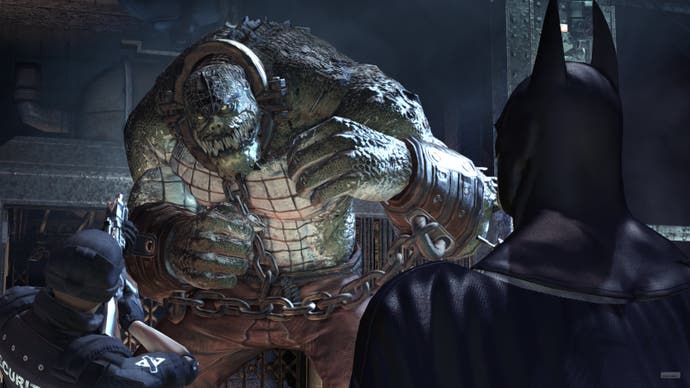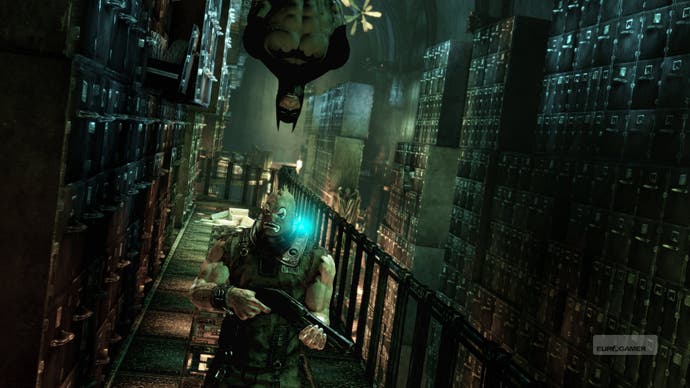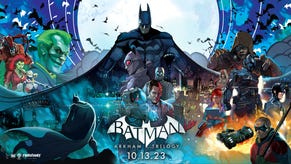Batman: Arkham Asylum
Hospitality.
Controls are refreshingly simple, your main options being stun, attack, and parry, all mapped to face buttons. Lock-on is automatic, and the animation has a habit of fitting itself in contextually, choosing by itself whether to knee-drop someone, or grab their kicking leg and flip them backwards, say, whenever you press a button, which means that, for the first few attempts at least, you might suspect Arkham is playing itself.
It isn't. Like Assassin's Creed, this is a game of crowd management, and while it moves at a faster pace than Ubisoft's title, it's still generally better to wait for an attack and retaliate rather than wade in swinging, with enemy moves announced in advance by a lightning bolt icon above their heads, giving you time to parry, before daring you to see how many powerful counters you can afford before someone else has a pop.
At the heart of the fighting is the combo system, a time-based arrangement requiring you to chain moves together in order to keep your points multiplier rising. When you're playing well, jumping off someone's chest and landing on someone else's head, before backflipping to unteeth the weirdo coming at you out of the shadows, you'll almost hear a drum-beat in your head, telling you exactly when to hammer the buttons. It's strange enough, after years of disappointments, to find a developer that really understands what a Batman game should feel like, but stranger still, perhaps, to realise that what it should feel like is a mixture of elegant brawling and rhythm action.

The second challenge room, Silent Knight, is a little more thoughtful, showcasing a mode known, worryingly, as Invisible Predator. Happily, rather than an Yvette Fielding Living TV documentary exploring the wacky dangers of kitchen-based bacteria, it's actually another variation on room clearance, focusing on mazelike level design, and exchanging skill points for a timer as leaderboard currency. The agenda is the same, but the emphasis is completely different. You've seen Batman at his most powerful: this is him at his most vulnerable, with heavily-armed enemies turning a simple combat scenario into a stealthy assault course.
As gunfire is so deadly, the game quickly finds a new groove, alternately swooping in for a one-button takedown before zipping back up to safety with the auto-locking grapnel gun, ducking bullets as you try to lose yourself in shadows to plan your next move. Victory is about strategy: as you take goons out, the survivors will get increasingly panicky, and more prone to blindly firing into the darkness, while a press of LB switches you to Detective Mode, a kind of heat vision where you can instantly see where everybody is, what weapons they're carrying, and how freaked out they've become. But the standout element is the gadgets mapped to the d-pad: the batarang can be used to stun enemies or simply create a distraction, while a sonic variation gives you thirty seconds of pulsing sound, the batclaw blasts out on a wire to grab distant attackers and yank them off gantries, and the explosive gel can be sprayed onto the surroundings and detonated at your convenience.

They're fun on their own, but far more interesting when you learn to combine them, luring an enemy over to a ledge with a batarang and then clawing them off into space, or embedding the sonic batarang in gel, and taking out five villains at once. With these on your utility belt, Arkham Asylum seems intermittently capable of nailing that same elusive hide-and-seek feel that Riddick possesses, turning stealth into a way to broaden your options as much as narrow them.
So while the challenge rooms offer a very narrow window onto Arkham Asylum, they still leave a promising impression. There are potential problems - the multi-trigger controls needed to use some of the gadgets take a little getting used to, and, elsewhere, the turning speed of the camera is currently stately rather than brisk - but these are small gripes, and relatively early days. As an unlockable, then, this is a lot more interesting than the usual stack of concept art and blurry snaps detailing the developer's last office party; as an indicator of the broader game, however, it shows a promising understanding of the licence, tied to a central realisation that, while any old supersomebody can make you feel heroic, only Batman can make you feel truly dangerous.
Batman: Arkham Asylum is due out for PS3, Xbox 360 and PC this year.















